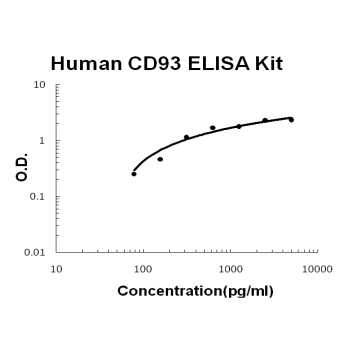Human CD93 ELISA KIT (1 x 96 wells)
CAT#: EA102946
The Fast version of Picokine ELISA kits, assay takes less than 1.5 hours. Detect Human C1Q R1/CD93 with <10pg/ml sensitivity. Format: 96-well plate with removable strips. Compatible samples: cell culture supernates, serum, plasma( heparin, EDTA), saliva and urine. This is a TMB colorimetric sandwich ELISA kit with short assay time and fast experiment set up. C1Q R1/CD93 tissue specificity: Highly expressed in endothelial cells, platelets, cells of myeloid origin, such as monocytes and neutrophils. Not expressed in cells of lymphoid origin.
USD 555.00
3 Weeks*
Product Images

Specifications
| Product Data | |
| Format | 8x12 divisible strips |
| Assay Type | Sandwich ELISA kit of Quantitative Detection for human CD93 |
| Assay Length | 3.5 hours incubations; 1 hour washing and analyzing samples |
| Signal | Colorimetric |
| Curve Range | 78pg/ml-5000pg/ml |
| Specificity | This kit is used for quantitative detection of human CD93 |
| Sensitivity | <10pg/ml |
| Reactivities | Human |
| Cross Reactivity | There is no detectable cross-reactivity with other relevant proteins. |
| Components |
|
| Background | CD93 (Cluster of Differentiation 93) is a protein that in humans is encoded by the CD93 gene. CD93 belongs to the Group XIV C-Type lectin family and is mapped to 20p11.21. The protein encoded by this gene is a cell-surface glycoprotein and type I membrane protein that was originally identified as a myeloid cell-specific marker. The encoded protein was once thought to be a receptor for C1q, but now is thought to instead be involved in intercellular adhesion and in the clearance of apoptotic cells. The intracellular cytoplasmic tail of this protein has been found to interact with moesin, a protein known to play a role in linking transmembrane proteins to the cytoskeleton and in the remodelling of the cytoskeleton. It has also showed that this receptor is a positive marker for all bone marrow-repopulating stem cells because it is expressed on both CD34-negative and CD34-positive stem cells from umbilical cord blood and adult bone marrow. In addition, highly purified lineage-negative cells with the CD93 protein not only have bone marrow-repopulating capacity but also can differentiate into human hepatocytes in vivo. |
| Gene Symbol | CD93 |
| Standard Curve |

Human CD93/C1qR ELISA Kit standard curve
|
Documents
| SDS |
{0} Product Review(s)
Be the first one to submit a review






























































































































































































































































 Germany
Germany
 Japan
Japan
 United Kingdom
United Kingdom
 China
China